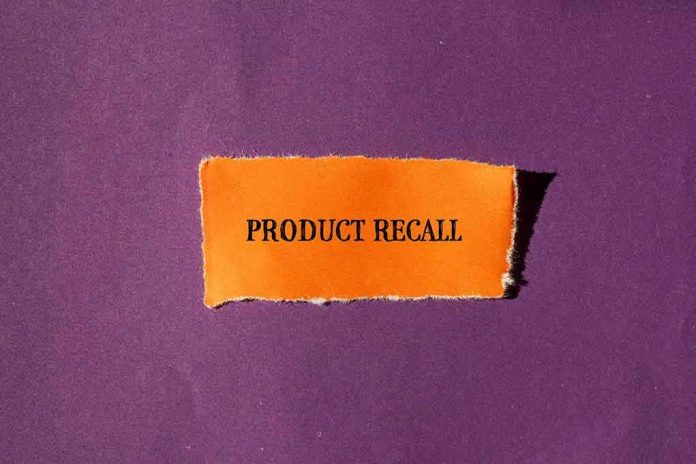
Thousands of Sam’s Club shoppers across the country are being urged to check their pantries after a major nationwide recall of Member’s Mark Freeze Dried Fruit Variety Packs due to the detection of Listeria monocytogenes—a dangerous bacteria with the potential to cause serious illness in vulnerable Americans.
Story Snapshot
- Member’s Mark Freeze Dried Fruit sold at Sam’s Club stores in 42–43 states recalled over Listeria contamination risk
- No illnesses reported; recall initiated after internal testing flagged contamination
- FDA and Doehler Dry Ingredient Solutions, LLC urge customers to discard affected products and seek refunds
- The recall affects a popular brand and underscores ongoing food safety concerns for American families
Contaminated Snack Prompts Nationwide Recall
Doehler Dry Ingredient Solutions, LLC, the supplier of Member’s Mark Freeze Dried Fruit, issued a recall for 15-count variety packs distributed at Sam’s Club locations from July 1 to July 25, 2025. This action followed internal product testing that detected Listeria monocytogenes, a bacterium responsible for the potentially fatal illness listeriosis. The recall impacts stores in 42 to 43 states, making it one of the more extensive food safety incidents involving a major American retailer this year. While there have been no reported cases of illness as of the recall date, both Doehler and the U.S. Food and Drug Administration (FDA) emphasize that the recall is precautionary and aimed at protecting consumers, particularly those who are pregnant, elderly, or immunocompromised.
The FDA and Sam’s Club acted swiftly, removing affected products from shelves and initiating broad public notifications. Consumers who purchased these variety packs are directed to throw away the product and obtain refunds through their local Sam’s Club stores. The FDA continues to monitor the situation and has committed to providing ongoing updates to ensure that the public remains informed and protected.
Food Safety Challenges in a Rapidly Changing Marketplace
Listeria monocytogenes is a well-known threat in the food industry, particularly in ready-to-eat and refrigerated foods. Recent years have seen an uptick in similar recalls, with the United States food supply chain facing pressure to maintain rigorous standards amid increased regulatory scrutiny and consumer demand for transparency. The recall of Member’s Mark Freeze Dried Fruit stands out not only for its scale but also for the speed and transparency with which it was handled. Doehler initiated the recall before any illnesses were reported, reflecting a commitment to compliance and consumer safety. Sam’s Club, as one of the nation’s largest warehouse retailers, has been transparent in communicating refund processes and recall details to its vast customer base.
These actions occur against the backdrop of heightened concern over government effectiveness and accountability. Many Americans have become frustrated with the previous administration’s perceived lack of responsiveness to food safety issues, and the expectation is now for swift, decisive action to protect public health and the interests of American families. This recall, while disruptive, demonstrates the kind of proactive approach that aligns with the priorities of responsible governance—transparency, accountability, and the defense of consumer rights.
Economic and Social Impacts on American Families
The immediate impact of the recall is the removal of potentially contaminated products from store shelves, with affected consumers eligible for refunds. For Doehler and Sam’s Club, the recall brings logistical challenges and possible financial losses, but their prompt response may help mitigate long-term reputational damage. For American families—especially those who value safe, reliable, and affordable food—the recall is a stark reminder of the need for vigilance in the food supply chain.
Long-term consequences may extend beyond this single incident. Increased scrutiny could lead to stricter regulatory requirements and more frequent testing for similar products. The public’s trust in private label brands and processed snack foods faces ongoing challenges, but transparent communication and responsible action from both government agencies and the private sector remain critical to restoring and maintaining consumer confidence. The broader food industry is likely to use this episode as a catalyst for reviewing and strengthening its own safety protocols, ensuring that American families receive the protection and service they expect and deserve.
Expert Analysis and Industry Response
Food safety experts note that while recalls are disruptive, they are essential tools for protecting public health. The absence of reported illnesses suggests that the recall was both timely and effective. Academic analysts argue that such incidents, while unsettling, can drive improvements in industry standards and foster greater transparency throughout the supply chain. Consumer advocates continue to call for even more stringent testing and reporting, while industry representatives emphasize the effectiveness of current detection and recall systems in swiftly addressing potential threats.
The FDA, alongside reputable media and food safety organizations, has provided consistent, fact-based reporting on the recall. Minor discrepancies exist in estimates of the number of affected states, but all credible sources agree on the main facts: the detection of Listeria, the scope of the recall, the absence of illnesses, and the ongoing efforts to protect the public. For those concerned about the safety of their families and the integrity of our food systems, vigilance, transparency, and accountability remain non-negotiable values.



